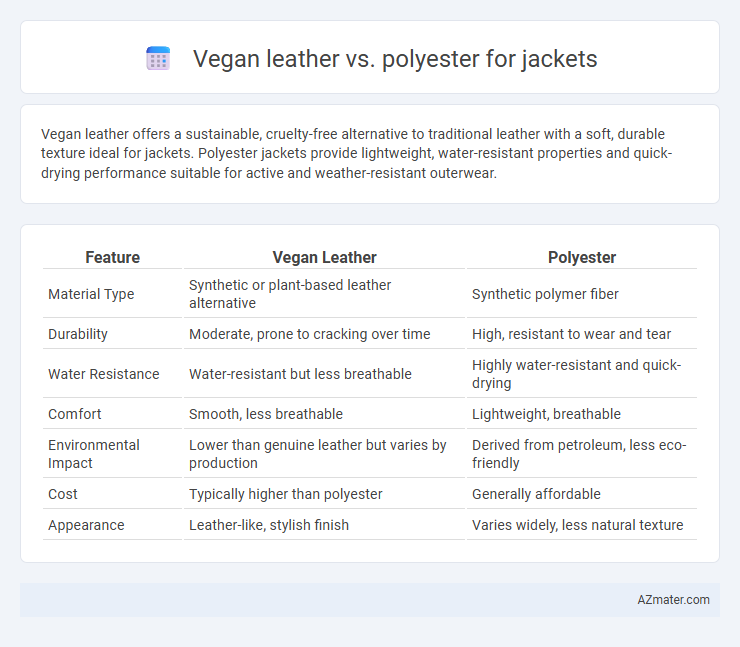Vegan leather offers a sustainable, cruelty-free alternative to traditional leather with a soft, durable texture ideal for jackets. Polyester jackets provide lightweight, water-resistant properties and quick-drying performance suitable for active and weather-resistant outerwear.
Table of Comparison
| Feature | Vegan Leather | Polyester |
|---|---|---|
| Material Type | Synthetic or plant-based leather alternative | Synthetic polymer fiber |
| Durability | Moderate, prone to cracking over time | High, resistant to wear and tear |
| Water Resistance | Water-resistant but less breathable | Highly water-resistant and quick-drying |
| Comfort | Smooth, less breathable | Lightweight, breathable |
| Environmental Impact | Lower than genuine leather but varies by production | Derived from petroleum, less eco-friendly |
| Cost | Typically higher than polyester | Generally affordable |
| Appearance | Leather-like, stylish finish | Varies widely, less natural texture |
Introduction to Vegan Leather and Polyester
Vegan leather, crafted from synthetic materials such as polyurethane or innovative plant-based alternatives, offers a cruelty-free and eco-friendly option for jackets with a leather-like appearance and texture. Polyester, a durable and versatile synthetic fiber derived from petroleum, is widely used in jacket production for its moisture-wicking, wrinkle-resistant, and insulating properties. Comparing vegan leather and polyester in jackets involves evaluating factors like sustainability, breathability, durability, and maintenance requirements.
Material Composition: Vegan Leather vs Polyester
Vegan leather is primarily composed of polyurethane (PU) or polyvinyl chloride (PVC) combined with a fabric base like cotton or polyester, offering a sustainable alternative that mimics genuine leather's texture and durability. Polyester jackets are made from synthetic polymer fibers derived from petroleum, known for their lightweight, water-resistant, and quick-drying properties. While vegan leather emphasizes eco-friendliness and animal-free sourcing, polyester excels in versatility and moisture management, influencing jacket performance and care requirements.
Environmental Impact Comparison
Vegan leather, often made from polyurethane or plant-based materials, generally has a lower carbon footprint than traditional leather but can still involve toxic chemical processes and slow biodegradability. Polyester jackets, derived from petrochemicals, contribute significantly to microplastic pollution and require substantial fossil fuel resources, leading to higher environmental degradation during production and disposal. Choosing jackets made from recycled polyester or innovative plant-based vegan leathers can reduce environmental impact by minimizing resource consumption and enhancing recyclability.
Durability and Longevity
Vegan leather offers moderate durability with resistance to scratches and water but may degrade faster under extreme conditions compared to polyester, which excels in long-term strength and abrasion resistance. Polyester jackets maintain shape, color, and tensile strength over time, making them ideal for heavy use and frequent washing. The choice between vegan leather and polyester hinges on balancing aesthetic appeal and sustainability with practical considerations of wear and longevity.
Comfort and Breathability
Vegan leather jackets offer a stylish, cruelty-free alternative but tend to have lower breathability and may trap heat, causing discomfort during extended wear. Polyester jackets excel in moisture-wicking and airflow, providing superior comfort and breathability, especially in warmer conditions or active use. Selecting between vegan leather and polyester depends on prioritizing aesthetic appeal versus functional comfort and ventilation.
Style and Aesthetic Differences
Vegan leather offers a sleek, polished look with a smooth texture that mimics genuine leather, enhancing jackets with a sophisticated, upscale aesthetic. Polyester jackets provide more versatility in patterns and finishes, often featuring vibrant colors and varied textures suited for casual and sporty styles. The matte or glossy sheen of vegan leather contrasts with polyester's fabric-like appearance, influencing the jacket's overall visual appeal and style statement.
Maintenance and Care Tips
Vegan leather jackets require gentle cleaning with a damp cloth and mild soap to maintain their texture and prevent cracking, avoiding excessive heat or harsh chemicals that can damage the material. Polyester jackets are generally more durable and machine washable, but they should be cleaned on a gentle cycle with cold water and air-dried to prevent shrinking and fabric wear. Proper maintenance of both materials extends their lifespan and preserves the jacket's appearance over time.
Cost and Affordability
Vegan leather jackets generally cost more than polyester due to the higher production expenses associated with synthetic leather alternatives made from polyurethane or plant-based materials. Polyester jackets offer greater affordability, as the fabric is mass-produced and easily sourced, reducing overall manufacturing costs. For budget-conscious consumers seeking cost-effective outerwear, polyester remains the more budget-friendly choice compared to vegan leather.
Ethical Considerations
Vegan leather offers an ethical advantage over polyester by being animal-friendly, avoiding animal cruelty and reducing reliance on animal farming, which has significant environmental and ethical concerns. Polyester, derived from petroleum, raises sustainability issues due to its non-biodegradability and contribution to microplastic pollution, impacting ecosystems and marine life. Choosing vegan leather supports cruelty-free fashion and reduces plastic pollution, aligning with environmentally and ethically conscious consumer values.
Final Verdict: Which Jacket Material is Better?
Vegan leather offers a sustainable and cruelty-free alternative with a luxurious look and water-resistant properties, making it ideal for fashion-conscious and eco-friendly consumers. Polyester jackets provide durability, affordability, and excellent moisture-wicking capabilities but lack the natural breathability and aesthetic appeal of vegan leather. For a balance of style, sustainability, and performance, vegan leather generally ranks higher, while polyester excels in functional and budget-friendly outerwear.

Infographic: Vegan leather vs Polyester for Jacket
 azmater.com
azmater.com